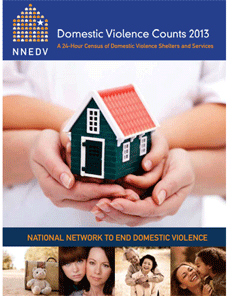 The latest Domestic Violence Counts report is out and the 2013 census of domestic violence shelters and services shows the devastating impact that economic insecurity can have on victims of abuse and their children.
The latest Domestic Violence Counts report is out and the 2013 census of domestic violence shelters and services shows the devastating impact that economic insecurity can have on victims of abuse and their children.
Each year, the National Network to End Domestic Violence (NNEDV) takes a look at the people served and the services provided during one 24-hour period at participating programs across the country. On September 17, 2013, just over 1,600 programs participated in the census. They served over 66,000 people. The stories behind the numbers range from uplifting to devastating.
“One of our program participants received a job offer on Census Day,” a Missouri advocate reported. “This employment opportunity will provide her with an income to be able to exit the shelter and obtain and retain her own housing for her family.”
But an advocate in Alabama shared: “Despite extreme stalking and a high threat of danger, a survivor was denied community legal services because there was no physical abuse. The survivor makes minimum wage and is unable to afford a divorce attorney.”
For women who experience domestic violence, economic security and personal safety are closely linked. Sara Shoener from the Center for Survivor Agency and Justice recently explained to the National Domestic Violence Hotline that domestic violence increases the risk for financial insecurity, and that poverty can increase the risk of vulnerability to abuse. “Domestic violence survivors often rank material factors such as income, housing, transportation, and childcare as their biggest considerations when assessing their safety plans,” she added.
Support services that help women establish economic security can help them leave abusive situations and stay safe. In addition to the basic necessities that Shoener listed above, a significant number of women also need help navigating the social services system. They may also need help building their financial literacy skills. In order to maintain control, an abuser might ruin a victim’s credit, fail to pay or hide bills, steal a victim’s possessions or misrepresent the state of their finances. It may take time and guidance for a survivor to get her financial house in order.
The Domestic Violence Counts report found that 29 percent of programs provided services related to building financial skills on the day that the census was taken. Eighty-three percent of programs provide this service throughout the year. And 22 percent of the programs surveyed provided job training and employment assistance on Census Day.
In spite of the clear need for more counseling and support around financial issues – and the dangers associated with economic instability – funding cuts and reduced resources across the country have meant that dozens of programs have had to reduce or eliminate their financial literacy services and job training and employment assistance programs.
These cuts may seem necessary now, but the long-term expense on our entire community is far too great. At the release of the Domestic Violence Counts report, it was revealed that eight million work hours are lost each year as a result of domestic violence in the United States. Victims of abuse may miss work because of injury, legal proceedings or sudden changes to their living situations.
“If we don’t pay for domestic violence aid now, we pay for it down the line through healthcare, lost productivity and the impact on children exposed to violence,” said Kim Gandy, president of NNEDV.
The services and models for assistance are already in place – now we need to restore and increase funding to these programs so that more survivors can have the safety and security that everyone deserves. On September 17, 2013, nearly 400 people in DC, Maryland and Virginia who reached out to a shelter or service provider for help were turned away because the providers did not have the room or resources to serve them. No woman whose personal safety is at risk, and who reaches out for help should ever be turned away. And no mother should have to stay with an abuser because she has nowhere to take her children.
Three Things You Can Do to Help
- Support organizations like The Women’s Foundation, which invests in programs like Doorways for Women and Families, a Northern Virginia nonprofit that’s providing one-on-one financial counseling to survivors of abuse.
- Join NNEDV in a push for Congress to support full funding for domestic violence programs. Click here to find and reach your members of Congress.
- Understand the signs of abuse, educate yourself on how to help victims, and donate your old cell phone to a program that gives phones and airtime to victims of domestic violence.

